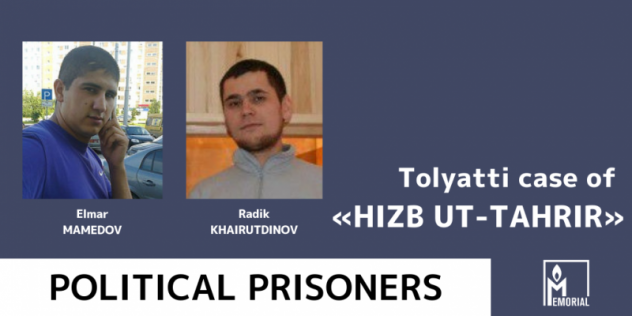Two more Muslims from Tolyatti, prosecuted for involvement in the banned organisation Hizb ut-Tahrir, are political prisoners
Radik Khairutdinov and Elmar Mamedov have been charged with participating in the activities of a terrorist organisation, although they have not been charged with any acts of violence, preparation of such, or incitement or justification of violence
Memorial Human Rights Centre, in accordance with guidelines defining the term ‘political prisoner,’ considers Radik Khairutdinov and Elmar Mamedov political prisoners. We believe they are being prosecuted for political reasons because of their non-violent exercise of the rights to freedom of conscience, religion, speech and association in order to strengthen and maintain the authority of those in power. On the basis of current information, they are being deprived of liberty in the absence of a crime and in violation of their right to a fair trial. Memorial calls for the immediate release of Khairutdinov and Mamedov.
Who are Radik Khairutdinov and Elmar Mamedov?
Radik Khairutdinov, 34, and Elmar Mamedov, 32, were detained on 23 September 2019 in Tolyatti together with two other local Muslims — Rais Mavlyutov and Aleksei Botva. They were then all taken into custody.
Khairutdinov and Mamedov have been charged with participation in the activities of a terrorist organisation (Article 205.5, Part 2, of the Russian Criminal Code) because of their involvement in the Islamic party Hizb ut-Tahrir al-Islami, which is banned in Russia.
In addition, Mamedov has been charged with justification of terrorism (Article 205.2, Part 2, of the Russian Criminal Code) for posting on his Facebook page two videos and photos of military operations in Syria.
Their trial has now begun in the Volga District Military Court in Samara.
Why does Memorial consider them political prisoners?
The charges of terrorism against Khairutdinov and Mamedov are based solely on their membership of the Islamic party Hizb ut-Tahrir al-Islami, which is banned in Russia. We believe the designation of this organisation as terrorist is unjustified and unlawful. The decision of the Russian Supreme Court, adopted in 2003, which banned the activities of a large number of Islamic organisations, devoted one paragraph of three sentences to Hizb ut-Tahrir. The three sentences contain no evidence of terrorist activities.
Since November 2013, when Article 205.5 was added to the Russian Criminal Code, the mere fact of participation in events held by Hizb ut-Tahrir has been sufficient to be convicted of a terrorist offence, the penalties for which even include life imprisonment. At the same time, for a conviction to be brought, it has ceased to be necessary to prove facts of preparation or implementation of terrorist crimes.
We would point out that Article 28 of the Russian Constitution guarantees everyone ‘freedom of conscience, freedom of religion, including the right to profess individually, or jointly with others, any religion or not to profess any religion, to freely choose, have and disseminate religious and other beliefs and act in accordance with them.’
There is no evidence that the defendants committed or planned violence, still less committed actions that can be called terrorism in the common sense meaning of the term.
The prosecution is based on the testimonies of three classified witnesses who stated that the defendants proposed, in the mosque, that they become acquainted with the literature of Hizb ut-Tahrir; and on the testimonies of one person now in prison, also convicted of membership in Hizb ut-Tahrir, and of the accomplice of the defendants who pleaded guilty and reached a plea bargain with the investigators.
According to the indictment, the whole guilt of the defendants lies in the fact that they ‘deliberately and purposefully, jointly and by mutual agreement, acquired a thorough knowledge of the ideology of the organisation’ and ‘misled Muslims, in terms of their religion, substituting for the traditional approach to disseminating this religion in society the notion of fostering organised anti-constitutional activities in the Russian Federation, based on the doctrine of the fundamental stage-by-stage creation of a theocratic unitary state — the World Islamic Caliphate — that contradicts the traditional interpretation of Islam.’
In other words, they are officially accused of distorting the ideas of Islam. However, a decision on the ‘correctness’ of believers’ interpretations of religious and philosophical issues in no way lies within the competence of the State or of the investigative bodies and does not correspond to those articles of the Criminal Code under which the charges have been brought.
As far as the charges of advocating terrorism laid against Mamedov are concerned, the video clips he published are only about the humanitarian catastrophe in the Syrian city of Aleppo during its siege by government troops. They do not contain any incitement of violence or justification of terrorism, but condemn the use of weapons of mass destruction in a military conflict that primarily affects the civilian population. The fact that Mamedov is accused of reposting materials from official and well-known media, the BBC and Radio Liberty, which are officially registered and operate legally in Russia, is particularly surprising and cause for concern. These materials were posted on the websites of these media outlets and no complaints were made about them by Russian investigative or supervisory bodies. The only reference to ISIS, which is banned in Russia and whose propaganda Mamedov is accused of disseminating, is the phrase ‘ISIS could never have dreamt of such a thing’ in his comments on the publications.
Recognition of an individual as a political prisoner or as a victim of politically motivated prosecution does not imply Memorial Human Rights Centre agrees with, or approves of, their views, statements, or actions.
More information about the case and the opinion of Memorial Human Rights Centre is available on our website.
How you can help
You can support all political prisoners by donating to the Fund to Support Political Prisoners of the Union of Solidarity with Political Prisoners via PayPal, using the e-wallet at [email protected].




